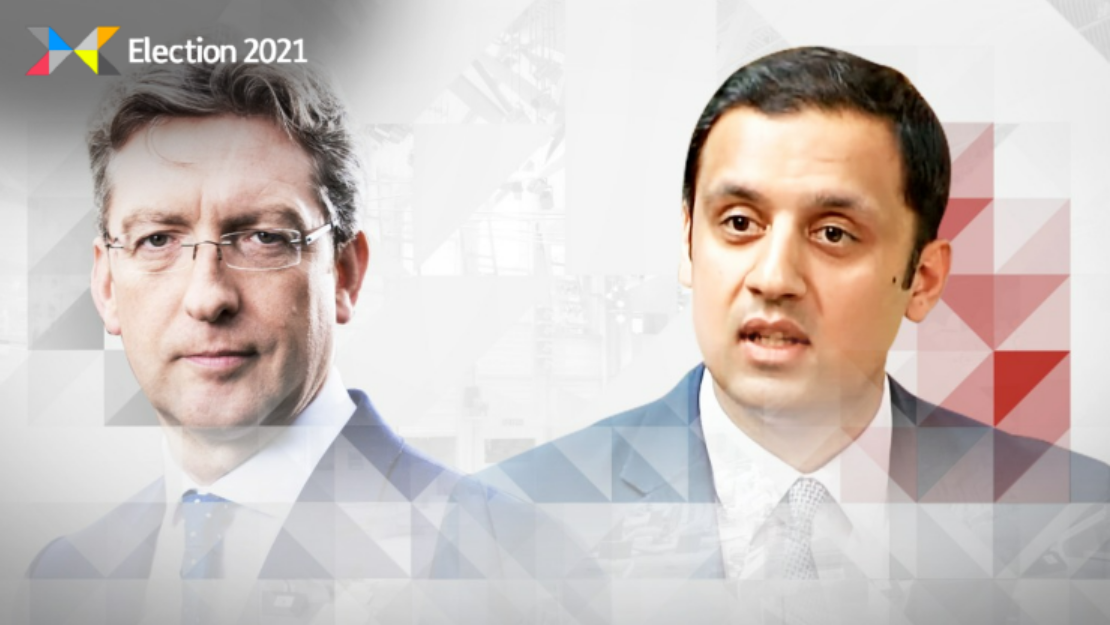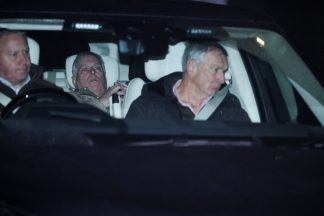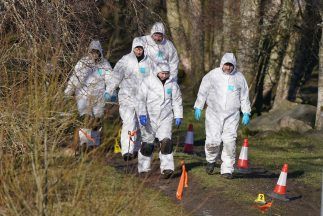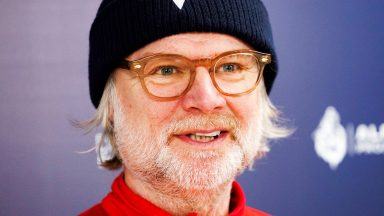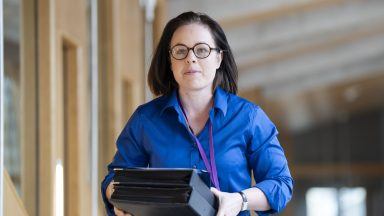Over the coming weeks STV will be hosting a series of exclusive interviews with the main political party leaders taking part in May’s Holyrood elections.
Next up is the leader of Scottish Labour Anas Sarwar, who sat down with STV News political editor Colin Mackay to outline the party’s message and vision for the country.
Colin Mackay: Since the start of the Scottish Parliament, Labour has gone from government to the third party. It’s quite a slide. And now you say you’re fighting for second place. It’s not much of a pitch is it?
Anas Sarwar: Look, I’m being honest about the challenge the Labour Party has faced over the last 20 years. In the last few years we haven’t been good enough as a political party. I’ve been honest about that when I took over as leader. Three days before I became leader we were at 14% in the opinion polls. Of course it’s up to the people of Scotland to decide over the next couple of weeks. But I am determined to get the Labour Party back on the pitch, to be arguing what our country should be arguing about, around our national recovery. To make sure we come through this tough year. Probably the toughest year in our lifetime. And use this opportunity to build a stronger and fairer nation.
CM: Something that has been a mission for the Labour Party is to lift children out of poverty. About a quarter of a million children are living in poverty in Scotland just now. How soon can you tackle that?
AS: Well actually in some parts of Scotland it’s as high as one in two children. In the First Minister’s own constituency for example, the figure is one in two which is not acceptable. I want us to eradicate child poverty by 2030. I think we have the powers in Scotland to start that huge progress straight away. That’s why I want us to immediately double the child benefit from £10 to £20. I want to make sure we have a mass job retention scheme, and a job recruitment scheme as part of our recovery programme. And then also invest in other parts of our economy and other parts of our public services, so we can confront the scandal that is child poverty.
CM: Monica Lennon during the Labour leadership contest called on the child benefit to be increased to £30. That could have lifted thousands more kids out of poverty. Are you just not being very ambitious there?
AS: You’ve seen other Scottish parties suggest that we should double the Scottish child benefit payment by the end of the next parliament… I know other parties are saying that.
CM: What I’m saying is “are you being ambitious enough”?
AS: I’m the same as the child poverty action group who want us to immediately double the child payment. But alongside that, and this is a crucial difference, I want us to introduce a new disability payment. Because you are disproportionately more likely to live in poverty if you directly have a disability or someone in your household has a disability. And that’s why I want an additional payment so we can support those families, so we can help challenge child poverty.
CM: But there is an interim target of cutting child poverty by 18% by 2023-24. Now the Joseph Rowntree Foundation say that you would have to at least double the child payment. That’s what you’re doing. But all the other parties are doing it as well. So you’re doing the least you have to, to make that target.
AS: In terms of policy package, doubling it is the least we have to do. Other political parties are suggesting we do it over the course of the next parliament. I’m suggesting we do it immediately so we can lift tens of thousands of children out of poverty. But then we have to link poverty with other parts of our economy. So we know coming through the viral pandemic there is a huge crisis facing the jobs crisis that could come. If we choke off supply to the economy too early. So I want to see us supporting businesses through the transition period. I want to make sure we don’t have a cliff edge on furlough. There are 360,000 citizens sitting on furlough at the moment worried about if and when they will have a job to go back to. Also it will help lift people out of poverty.
CM: But the Joseph Rowntree Foundation says that if you increased the child benefit payment to £40 now, you could actually get rid of 90% of child poverty. Why aren’t you doing that? Why isn’t that the big thing in your manifesto?
AS: If a proposal comes forward in the next Scottish parliament…
CM: Why aren’t you making that proposal in this election?
AS: We are putting forward a package of measures in this election campaign around a recovery plan, around jobs…
CM: But you say you could eradicate child poverty by 2030. They are saying you could eradicate it now by doing that…
AS: Look we immediately want to double the child payment. We are happy to work with and engage the Joseph Rowntree Foundation…
CM: But you’re not actually going to do what it takes to eradicate it right now. You could achieve Labour’s mission right now…
AS: I am pleased Colin that you are accepting, and I hope other people accept we have the powers in Scotland to eradicate child poverty.
CM: But you’re not willing to use them right now…
AS: No I’m saying let’s double the child benefit payment. I’ll back any other party that makes that proposal. But also alongside that, let’s invest in our economy, get people back to work, invest in new businesses, get people back to well paid work, and lift people out of poverty across the country.
CM: You also want to give shoppers £75 vouchers to spend in shops to help rebuild the high street. Did you not get the Joanne Lamont memo when she was leader, saying that there’s too much offered for free?
AS: That’s a really important policy and I think it’s important to look at the detail of that policy.
CM: But it’s something for nothing, which is what she described…
AS: It’s a really, really important stimulus package for our economy. So what we’re suggesting with that policy is to give every adult in Scotland a £75 pre-paid card that cannot be used online and have to buy non-food retail. And the reason for that is the high streets were facing a huge crisis even before the pandemic. And that has been sped up by the pandemic. Shoppers cultures have changed. They are using more and more online shopping, like Amazon. And that has meant that high streets have been decimated across the country. I want us to make sure we have businesses that continue to grow, businesses staying open, creating new jobs and that is encouraging people to get on the high street when it is safe to do so, change people’s behaviour and create a stronger economy.
CM: But it would cost £340m approximately. Another £90m for your ‘staycation’ scheme to give everyone a holiday. If you combine those costs, that’s the same as the cost of putting the Scottish child payment up to £40. Wouldn’t that be a big thing to offer people in your manifesto?
AS: I think it’s important not to say we have the choice between helping those in poverty and the choice of unemployment going up. They are both connected. If we allow unemployment to exponentially rise due to the outcome of this pandemic, and how we respond to the pandemic, that in itself will lift child poverty levels. Not reduce child poverty. We spent almost £7bn over this pandemic on the furlough scheme. What we are saying in terms of our Scottish ‘staycation’ is it’s about reinvigorating our tourism industry, making sure we have new jobs and making sure we go from strength to strength.
CM: But you are putting those things above child poverty which you could eradicate now…
AS: Let me explain Colin. If we do not do these policies, that’s a £600m package, which is a drop in the ocean compared to the £7bn we have spent on furlough over the last year. That is going to help stop hundreds of thousands of people going unemployed. It’s also in with a job retention scheme and job creation scheme—the largest job creation scheme in the history of the Scottish Parliament. Create a 170,000 new jobs as well as protecting existing jobs in the economy. That in itself will help reduce child poverty and make sure we have an economy that will work for people in this country.
CM: Would you call yourself a socialist?
AS: Absolutely.
CM: And what kind of socialist would send their kids to a private school then?
AS: I’ve accept that’s a fair criticism. It’s a decision me and my wife made for the best of our children. But I think every parent that has looked in their children’s eyes during this pandemic will recognise how challenging this pandemic has been for our children and young people. That’s why I want us to invest in an education come-back plan which includes an individual assessment for every pupil across this country. But not just an educational assessment but also a mental health assessment as well. I want us to back that up with a tutoring programme, with one on one tutoring…
CM: But you’re buying all of that for your kids…
AS: I want every child across the country to prosper…
CM: But you’re buying that privilege for yours…
AS: I’ve accept that’s a fair criticism. It’s a decision me and my wife made for the best of our children. I want every child across the country to have the opportunity as part of that come-back, with a comeback pass when we can use the summer months, the sunshine hopefully coming out in Scotland for young people to rekindle their friendships, make new friendships and support their health and wellbeing and hopefully get raring to go after the school holidays.
CM: Here’s a question that Douglas Ross couldn’t answer the other night. What is the democratic route to independence? Another independence referendum if that’s what the people of Scotland want?
AS: I have been clear from the outset; it’s for the people of Scotland to decide their own future. I don’t dispute that…
CM: But how do they decide that without a referendum? Because you don’t want to give them referendums do you?
AS: I’m saying we can choose something different. So these aren’t ordinary times. This isn’t an ordinary election. This is a pandemic election where 10,000 of our citizens have lost their lives…
CM: But you’re saying they can’t have a referendum…
AS: I’m not saying that Colin. I’m saying that my view is I am advocating my case in this election campaign. I am trying to persuade people that we can choose something different.
CM: Are you saying you wouldn’t block a referendum in the next parliament?
AS: What I’m saying is I don’t support a referendum. I don’t support independence…
CM: But if the people of Scotland vote for that, you don’t think Boris Johnson should block that?
AS: I am a participant. I am not a commentator. I want to persuade people across the country that we can do something different…
CM: But you don’t seem to want to let Labour participate in this debate or take a stance?
AS: That’s not true. We have a stance.
CM: So no referendum in the next parliament?
AS: We don’t support a referendum. We don’t support independence. We think the next parliament should be a recovery parliament. An important point Colin is, Covid didn’t choose between yes, no, leave or remain. The aftermath is not going to choose between yes, no, leave or remain. I am not willing to say” I am only going to focus on half the population that agree with me on the constitutional question”—that’s not acceptable. I want to focus on everyone across this country. So we can all work in our national interest in the recovery against Covid. Come through this a stronger and fairer nation and focus on the next five years.
CM: The STUC at their meeting today backed a motion stating “the right to hold a referendum should lie with the Scottish Parliament as elected by the people” do you agree with that?
AS: There are some caveats within that. The STUC is talking about a recovery plan of their own. Which I absolutely support and agreed that should be our national focus.
CM: This is part of it. Do you agree with that part of it?
AS: They’re talking about if and when there is a referendum but also have made caveats or in what mandates a referendum. There are different views within the trade union…
CM: But are they right in principle? Should the Scottish Parliament decide, and the people who elect the Scottish Parliament, ultimately get that decision as well?
AS: Fundamentally it’s for the Scottish people to choose their own future. I accept that fundamentally it’s for the Scottish people to choose their own future.
CM: So there could be a referendum in the next parliament?
AS: What I’m saying is, I’m arguing for something different. I’m arguing for the next five years to focus on the Covid recovery
CM: That’s not necessarily what the people want. If the people say they want…
AS: I want to persuade people Colin…
CM: And you’ve got a couple of weeks left to do that. But as the polls suggest, if the majority of people vote for parties who back an independence referendum do you accept that?
AS: Look Boris Johnson is a disaster. And devolution is strong and right for the people of Scotland. Boris Johnson is a disaster.
CM: Is he a threat to the United Kingdom?
AS: Boris Johnson is the biggest threat to the United Kingdom and actually Douglas Ross used to agree with that and argue that himself. I’m not sure if he still agrees with himself on that position. Now the reality is, we have a choice…
CM: Why is Labour’s choice not to offer more power? Devo-max for example? There’s a lot of people in your own party suggesting it and people in the STUC as well…
AS: I’ll come to that second part of Devo-max in a second. What people are voting for is what they want the priorities to be over the next five years. If their priorities change they get to vote for new priorities. I want to focus on what unites us as a country not what divides us. Because these aren’t normal times, this isn’t an ordinary election. But in terms of devolution, I do want greater devolution. If we are true to wanting to build a recovery that works for everyone, then that has to be a recovery that is north, east, south, west. It has to be urban, rural, coastal, island.
CM: What more powers?
AS: For example around employment law. Around drugs deaths…
CM: Not Devo-max then?
AS: Look Devo-max can mean different things to different people. I want greater devolution across the UK. But that also crucially means devolution out from Holyrood to local authorities as well because if we are going to deliver a recovery that works for everyone, we have to push power out from our parliament to the regions from Holyrood to local communities so we can grow the economy right across our country.
CM: You say you want to be the second party of Scotland. The main opposition party. Isn’t the only record you hold in the Scottish parliament in the last few years is a record number of leaders?
AS: I accept the hardest job in British politics is being the leader of the Scottish Labour party. We don’t normally come with a good shelf life. I’m trying to change that. I’ve already been honest about the scale of the challenge facing the party. This is a process. If I was coming on this programme and saying to you Colin “you know in two weeks I’m going to be first minister” you’d probably be asking for someone to see me on the way out. And people at home would probably think I wasn’t being honest. I’m being honest with people. I want to take the Labour party on a journey and I believe that we can, over the course of the next five years go from the position we were in to having a Labour Government and a Labour First Minister.
Follow STV News on WhatsApp
Scan the QR code on your mobile device for all the latest news from around the country


